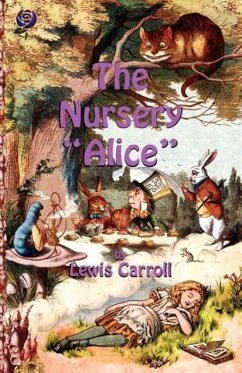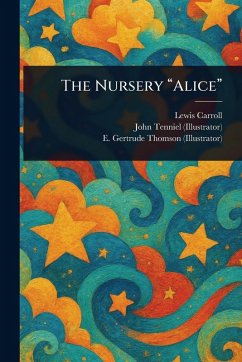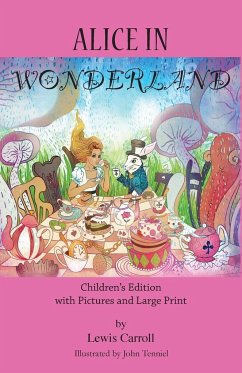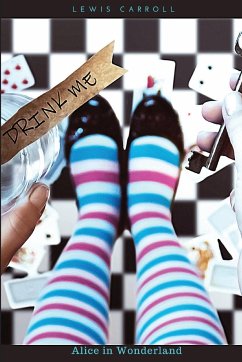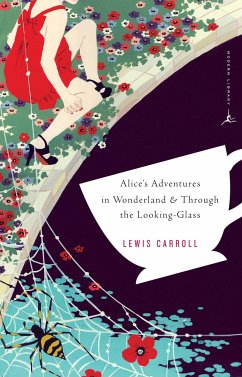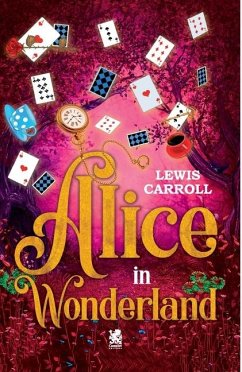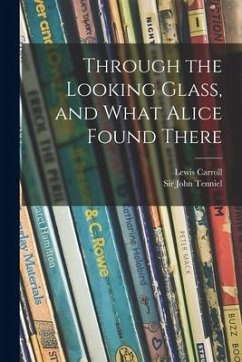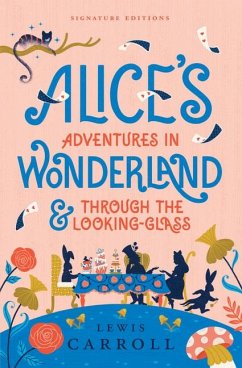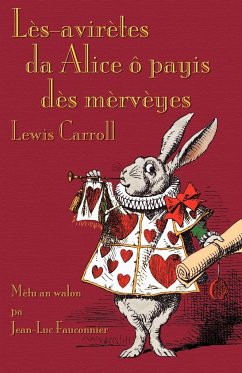
Lès-avirètes da Alice ô payis dès mèrvèyes
Alice's Adventures in Wonderland in Walloon
Versandkostenfrei!
Versandfertig in 1-2 Wochen
16,99 €
inkl. MwSt.

PAYBACK Punkte
8 °P sammeln!
Lewis Carroll, c'èst l'èspot di scrîjeû da Charles Ludwidje Dodgson qui f'yeut l' classe di matématiques al Christ Church d'Oxford. Dodgson a comincî a racontér ç'n-istwêre ci adon qu'i f'yeut ène pourmwin·nâde a bârquète su l' Tamîse, a Oxford, avou trwès djon·nes couméres: Alice Liddell, èl fîye du dwèyin dèl Christ Church èt sès deûs cheurs, Lorina, tréze ans, èyèt Edith qui d'aveut wit¿. Èl powème qu'èst ci ô cominç'mint du lîve raconte qui cès trwès couméres la ont soyi Dodgson pou qu'i lieû raconte ène istwêre. Èt c'è-st-insi qu'il-a présinté ...
Lewis Carroll, c'èst l'èspot di scrîjeû da Charles Ludwidje Dodgson qui f'yeut l' classe di matématiques al Christ Church d'Oxford. Dodgson a comincî a racontér ç'n-istwêre ci adon qu'i f'yeut ène pourmwin·nâde a bârquète su l' Tamîse, a Oxford, avou trwès djon·nes couméres: Alice Liddell, èl fîye du dwèyin dèl Christ Church èt sès deûs cheurs, Lorina, tréze ans, èyèt Edith qui d'aveut wit¿. Èl powème qu'èst ci ô cominç'mint du lîve raconte qui cès trwès couméres la ont soyi Dodgson pou qu'i lieû raconte ène istwêre. Èt c'è-st-insi qu'il-a présinté l' preumî vûdâdje di ç'n-istwêre la, ène miyète a malvô, d'jeut-i. Toudis è-st-i qui dins ci scrijâdje la on d'visse dès céns qui f'yît l' pourmwin·nâde a bârquète; l'istwêre a stî impriméye pou l' preumî côp an 1865. Èl walon, i vént du latin come sès cous¿ dèl famîye d'oïl èy' on l' divisse an Walonîye, in boukèt dèl Bèljique qu'èst dins l' sûd du payis, dins l' pârtîye dèl Bèljique èyu ç' qui l' lingâdje oficièl c'èst l' francès èt qu'on lome Fédération Wallonie-Bruxelles; lôvô, lès pârlâdjes réjionâls-langues régionales endogènes-come èl champènwès, èl lorin, èl picârd èyèt l' walon, is-ont l' chance d'awè ène èrcon'chance oficiéle dispûs 1991. Insi, is poul'nut yèsse disfindus sins qu'on-eûche a l' fé a muchète èy' is poul'nut mompliyi pus ôjî'mint. Èç traducsion ci a stî scrite an walon du coûtchant, èl cén dèl réjion di Châlèrwè. C'è-st-ène réjion qu'i-gn-a toudis yeû branmint dès-industrîyes - tchèrbonâdjes, vèr'rîyes, laminwêrs... -, èyu ç' qui dins l' tins, lès-ouvrîs, su leû b'sogne, is n' d'visît rén qu'an walon, dès-ouvrîs qui v'nît di tous lès quate cwins dèl réjion èt qu'ont mètu a dalâdje, pyane a pyane, ène koinè; c'èst djustumint dins ç' koinè la qu'on-a scrît l' traducsion. -- Lewis Carroll is the pen-name for Charles Lutwidge Dodgson, who was a lecturer of mathematics at Christ Church, Oxford. Dodgson started the telling of this tale on July 4, 1862 during a rowing boat tour on the Thames River at Oxford. Pastor Robinson Duckworth and three girls were members of the party: Alice Liddell, the ten-year old daughter of the dean of Christ Church, and her sisters Lorina, aged thirteen, and Edith, eight years of age. The poem at the beginning of the story states that the threesome urged Dodgson to tell them a story. And so he set out to present the first version of the tale, admittedly with some initial reluctance. Now and then, within the broader tale, reference is made to all five of the boat party; the story first appeared in print in 1865. Walloon derives from Latin, like its cognates of the oïl cluster (including French). It is spoken in Wallonia, a part of southern Belgium, in the part of Belgium where French is the official language and that is called Fédération Wallonie-Bruxelles; in this Fédération, the regional languages-Langues régionales endogènes-Champenois, Lorrain, Picard, and Walloon, have the good fortune to enjoy an official recognition since the year 1991, and so they can be defended openly and they can flourish more easily. This translation was made in western Walloon, the one used in the Charleroi area. This area has always been a very industrial one: coalmines, glassworks, rolling mills. It is an area where the working-class formerly spoke only Walloon at work. Those workers originated from all over the area. They gradually created a common working language, a Walloon koine. My translation has been written in that common variety.



